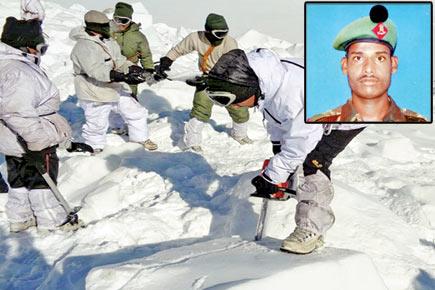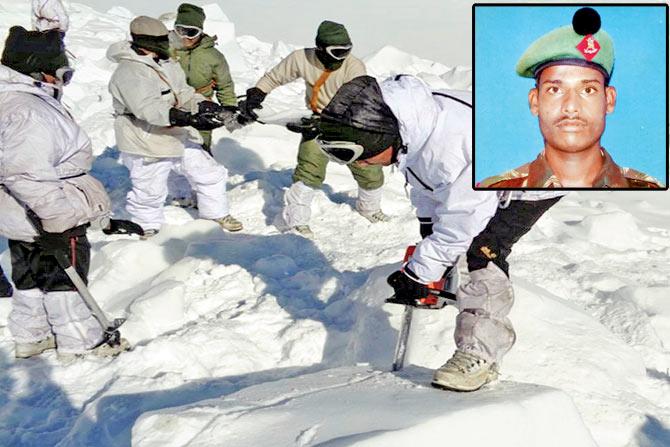Lance Naik Hanamanthappa Koppad who miraculously survived under 35 feet of ice and snow at the avalanche-hit army post in Siachen glacier continues to be critical, army hospital authorities said in New Delhi on Wednesday

New Delhi: Lance Naik Hanamanthappa Koppad who miraculously survived under 35 feet of ice and snow at the avalanche-hit army post in Siachen glacier continues to be critical, army hospital authorities said in New Delhi on Wednesday.
ADVERTISEMENT
Koppad has been kept on a ventilator in the ICU at the Army Research and Referral Hospital in New Delhi.

Lance Naik Hanumanthappa Koppad; (inset) soldiers cut through ice and snow in the search of survivors after a deadly avalanche on the Siachen glacier. Pics/PTI
"The soldier's condition remains the same. He is critical, and we are taking best care of him," a doctor at the hospital told IANS.
A medical bulletin released by the hospital later said the soldier "continues to battle the odds".
"...his medical condition remains very critical. He remains ventilator dependent since arrival," a statement from the hospital said.
"The medical team treating him at R&R Hospital is monitoring his situation continuously and is treating him with best expertise and resources available in the world," it said.
Asked how the soldier was saved in the extreme conditions, the doctor said they cannot comment on how he was saved, as they have no account of what exactly happened.
"Only when Lance Naik Koppad gains consciousness we will be able to get an account of how he managed to survive," the doctor told IANS.
Koppad and nine other soldiers were swept away by an avalanche at the Siachen glacier on February 3, at an altitude of around 19,500 feet. He was found on Monday, miraculously alive.
The soldier was found to be conscious but drowsy and disoriented. He was also severely dehydrated, hypothermic, hypoxic, hypoglycaemic and in shock.
He has pneumonia and his investigations have revealed liver and kidney dysfunction. But there was no cold exposure related frost bite or bone injuries to him.
The soldier is being treated by a team of intensivists, neurologist, nephrologist, endocrinologist and surgeons. He has been given fluids and drugs to bring up his blood pressure.
 Subscribe today by clicking the link and stay updated with the latest news!" Click here!
Subscribe today by clicking the link and stay updated with the latest news!" Click here!






